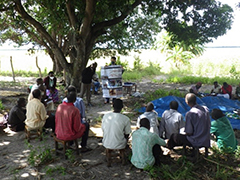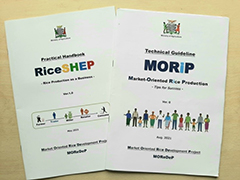MOReDeP Project Activity 3 - Market-Oriented Rice Farming model (Rice SHEP model) (2022-01-28)
The purpose of the Market-Oriented Rice Development project (MOReDeP) is to increase farmers' income through promoting rice production in Zambia.MOReDeP has been conducting a number of activities towards this end, and this third article in the series of the project activity introduction is about the "Market-Oriented Rice Farming Model" (or Rice SHEP model), which is a unique feature of the project.
The last two articles introduced "Research and Technology Development" and "Extension through Rice Cluster Approach". By these activities, it is expected that the use of the developed techniques would spread among existing and new rice farmers and that rice production will increase in the formed rice clusters. Since the purpose of the project is to increase farmers' income through promoting rice production, it is essential to ensure the income of each farmer actually increases along with the promotion of the rice production. In addition, for further promotion of rice production, rice must be an attractive crop for farmers. Thus, the MOReDeP developed the "Market-Oriented Rice Farming Model" under the theme of "rice production as a business". The project conducts activities to enhance farmers' knowledge and business skills to improve their income, such as selling their produced rice and also improving market access by rice farmers.
Till now, a survey was conducted to know the rice value chain and rice market, as well as farmers' common sales practices, and based on the results, a training program of the Market-Oriented Rice Farming model (Rice SHEP model) was developed. For example, the survey found that "only half of farmers obtained information of the market price of paddy before the sales, and there is a major difference on selling price by 24 % between farmers who knew the price and those who did not", content was incorporated regarding "access to market information". The survey result shows "the profit becomes more than 1.7 times larger if farmers mill paddy rice and then sell it, although 98% of farmers do not practice that" and thus, the topic about "sales of milled rice" was added. In keeping with other survey results, the program includes "Rice quality" (knowing the rice quality demanded in the market and producing quality rice)、"Off-season sales" (selling rice accounting for changes in price during different seasons), "Bulking" (minimizing cost by cooperative shipping/increasing marketing and negotiation power), etc. In the Western and Luapula provinces, the project conducted this training program for trainers as well as for farmers. The training program is not only an opportunity to acquire knowledge and information, but also to urge participants not to "Grow AND Sell" but "Grow FOR Sell"; participants develop their own business plans, utilizing and assembling the knowledge and information they acquire through the training and then determine to bring into practice. According to the monitoring result of the training participants, a positive impact is already evident. For example, while the market price of paddy dropped from 2019/2020 to 2020/2021, the selling price by the training participants increased on the contrary by 8.9%.
While continuing the activity to expand the model, the project will regularly monitor the farmers and conduct a research project to study the impact of the introduction of the model, and improve the model based on the result. Furthermore, the survey result shows that 89% of farmers have a challenge associated with access to the rice market. Therefore, we will support them to explore the market (for instance, making opportunities to link the farmers to buyers/rice millers), so that the farmers can secure a stable market to which they can sell rice at an appropriate price.
The last three articles introduced the summary of our main activities: "Research and Technology Development", "Extension through Rice Cluster Approach" and "Market-Oriented Rice Farming Model". Still, there are other important activities including, enhancement of rice research and training facilities, improvement of seed production, promotion of agricultural mechanization", and collaboration with other aid agencies (African Development Bank (AfDB), United Nations High Commissioner for Refugees (UNHCR), etc.). We will introduce such activities here in the future.

Training for Farmers

Developed Training Materials
